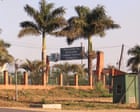
In today’s global landscape, an array of interconnected issues draws attention from various corners of the globe, each demanding mindful consideration and resolution. Let’s explore recent developments in these areas with clarity and calmness, offering insights that foster understanding and awareness.
The small kingdom of Eswatini finds itself at the center of an international debate following a contentious deportation agreement with the United States. Five men, hailing from Vietnam, Jamaica, Laos, Yemen, and Cuba, were deported to Eswatini under this agreement. Civil society groups and the largest opposition party in Eswatini have voiced concerns, characterizing the deal as “human trafficking disguised as deportation.” The arrangement marks a pivotal moment as Eswatini, an absolute monarchy, navigates its role in global diplomatic interactions. This development reflects broader global migration issues, exemplifying the complexities of international relations and human rights.
Meanwhile, in the United Kingdom, significant implications arise from announced aid budget cuts, as highlighted by the Foreign, Commonwealth & Development Office’s (FCDO) impact assessment. The decision to reduce the aid budget from 0.5% to 0.3% of the national income is poised to significantly affect children’s education and escalate health risks in various African countries. This decision, made to redirect funds toward national defense, underscores the challenging balancing act governments face between domestic priorities and global responsibilities. Addressing these challenges requires thoughtful dialogue and strategic cooperation among international partners.
In a different sphere, non-profit organizations in the United States are raising concerns over the treatment of detained immigrants at the “Alligator Alcatraz” facility in Florida. This facility, situated in the rural expanse of the Everglades, has become a focal point for human rights advocates, who report deplorable conditions including a lack of medical care and overcrowding in flood-prone areas. The plight of 14 Mexican citizens detained here has amplified calls for the facility’s closure, inviting reflection on the human rights dimension of immigration policies and the importance of humane treatment for all individuals.
Turning to Saudi Arabia, recent reports from human rights activists shed light on restrictive travel bans placed on women’s rights advocates in the country. Individuals such as Loujain al-Hathloul and Maryam al-Otaibi have reportedly been prohibited from leaving the country in what many view as a measure to curb dissent. These restrictions extend beyond the individuals to their family members, reflecting broader themes of freedom of expression and movement. As the global community observes these dynamics, continued advocacy and dialogue remain essential in advancing human rights commitments worldwide.
In legal news, a significant decision by Australia’s federal court has granted five women the opportunity to pursue legal action against Qatar Airways. This step follows their claims of invasive physical examinations at Doha’s airport in 2020. The court’s ruling demonstrates the avenues available for individuals to seek redress and underscores the importance of accountability within international transportation and security protocols. As the legal process unfolds, it reinforces the tenets of justice and equity in protecting individual rights.
These diverse developments exemplify the multilayered nature of global issues, each interconnected and impactful. Through thoughtful dialogue, we hold the potential to navigate challenges collaboratively, finding pathways that respect individual dignity and collective well-being. In this increasingly interconnected world, the mindful engagement of communities and nations becomes a powerful catalyst for positive change.
Source: {link}
